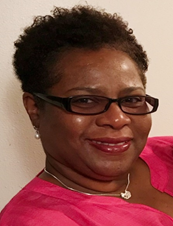by Angela M. Chalk
 Mirrors are a reflective surface that provides a clear image. They give a true representation of what is seen. The experience I share is my story as a Community Science Fellow with the American Geophysical Union’s Thriving Earth Exchange. This journey began as a community leader to solve a problem facing the neighborhood in which I reside. That neighborhood is the 7th Ward of New Orleans, Louisiana. I am a fourth-generation resident. Four of seven generations of my family have lived in a house that my grandfather won in a card game. This was in the 1940s and a true story.
Mirrors are a reflective surface that provides a clear image. They give a true representation of what is seen. The experience I share is my story as a Community Science Fellow with the American Geophysical Union’s Thriving Earth Exchange. This journey began as a community leader to solve a problem facing the neighborhood in which I reside. That neighborhood is the 7th Ward of New Orleans, Louisiana. I am a fourth-generation resident. Four of seven generations of my family have lived in a house that my grandfather won in a card game. This was in the 1940s and a true story.
The 7th Ward is a historically black neighborhood in New Orleans, home to over 6,500 residents, 94% of whom are African American (DataCenter Research, 2000). The 7th Ward plays an important role in the history and culture of New Orleans and this African American community. Historically it is the center for New Orleans’ Creoles, a working-class neighborhood that was especially known for skilled laborers in the building trades. The 7th Ward has rich cultural institutions such as social aid and pleasure clubs, St. Augustine High School, Mardi Gras Indian tribes, musicians, and artists, as well as faith-based institutions.
There are many long-term residents and families in the neighborhood, and a growing population of new residents and Hispanic residents. Healthy Community Services (the organization I’ve founded and of which I am the current Executive Director) is committed to providing residents of this vulnerable community with the knowledge to improve their quality of life by reducing and/or eliminating the negative factors of the social determinants of health. The 7th Ward neighborhood faces several challenges, including gun violence, repetitive flooding, drug proliferation, post-Katrina blight, gentrification, access to quality housing and the lack of safe green spaces. In 2000 the 7th Ward had a 38% poverty rate, 10% higher than New Orleans as a whole.
The values that commit me to this neighborhood were instilled at an incredibly young age by a closely knit multi-generational family, with very strong-willed matriarchal aunts. I contend it is incumbent upon me to make sure that my beloved 7th Ward has every opportunity to mitigate the effects of climate change and sea level rise, inclusive of more intense and frequent adverse weather events, and to improve access to healthy food sources. There is no room for error. There are no “do-overs.” Adverse climate change is the only non-discriminatory factor that affects each of us. It doesn’t matter where in this country one lives nor one’s belief in the science. The evidence is apparent each day. I challenge the reader. Look out your window. Is today the same as it was yesterday, last week or last month? Have you experienced an intense weather event, (i.e., urban flooding, snow, wildfires, tornadoes)? So, that leads me to the research project in which I’m a Co-Investigator.
I share this journey with Dr. Amy Lesen of Dillard University and Dr. Derek Van Berkel of the University of Michigan. AGU is the sponsor of a research effort focusing on urban reforestation efforts in the 7th Ward. This research is studying the impacts of the urban heat island effect in this neighborhood due to the lack of trees. This research is in its fifth year of monitoring heat sensors and the effects of planting 267 native trees in a 4X2 square block targeted area. These efforts are community driven actions and involve community-based participatory research that has been IRB reviewed by Tulane University, Dillard Universities and the University of Michigan, at different phases of the research.
The role of a Thriving Earth Exchange Community Science Fellow puts me in a unique role. I am both the Community Leader and the Guiding Facilitator as the Community Liaison. Here’s what I’ve learned. A communication strategy with the residents and partners are key to the continued success of this research. Oftentimes, issues become personal. This process has taught me patience and to remain objective to have unbiased results. While challenging at times, it is important to have trusted allies and a small circle of partners to ensure valid and reliable results. Remember, for me, failure is not an option.
###
NOTE: Angela Chalk holds a BA, Communications and Public Health Minor, Dillard University; MS of Health Care Management, University of New Orleans and is currently pursuing a Doctor of Health Care Administration at Virginia University at Lynchburg. She serves as member of the American Public Health Climate Health & Equity Advisory Board, the Advisory Board of the Coalition to Restore Coastal Louisiana and is a Past President of the Louisiana Public Health Association. She enjoys cooking traditional creole dishes with crops grown at Healthy Community Services Urban Green Infrastructure Farm.

2 Comments
D. HydeApr 17, 2021 at 9:39 AM
Congratulations! You do amazing working within the community and trurly have a vested interest.
philippeApr 19, 2021 at 7:10 AM
Angela is the quiet force that determines to build resiliency in her neighborhood one block at a time. The City of New Orleans is a pioneer climate resilience as a citizen